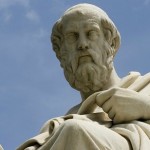We run our website the way we wished the whole internet worked: we provide high quality original content with no ads. We are funded solely by your direct support. Please consider supporting this project.
What is the “classical view of God” and what about it do you find objectionable?
The “classical view of God” refers to the view of God that has dominated Christian theology since the earliest Church fathers. According to this theology, God is completely “immutable.” This means that God’s being and experience never change in any respect. God is therefore pure actuality (actus purus), having no potentiality whatsoever, for potentiality is a power to change which, as I just said, is ruled out in classical theology. God is therefore also timeless (sequence-less), for “before” and “after” signifies some sort of change which, again, God is incapable of. Finally, God is “impassible” in classical theology, meaning that God is “above” experiencing emotion. To experience emotion God would have to be affected by something outside of himself, but this is impossible if God has no potentiality for any change. All these things were thought to be implied in the belief that God is “perfect.”
I’m currently working on a book (The Myth of the Blueprint) in which I’m trying to prove that this eternally-the-same conception of perfection has its roots in ancient Greek philosophy. This concept of perfection came to full fruition in a man named Parmenides, but it gained its most influential advocate in Plato who followed on Parmenides’ heels. In the Republic, Plato argued that the gods must be unchanging, for all change can only be for the better or for the worse, and since what is perfect cannot be improved or diminished, what is perfect must be completely unchanging. The argument is repeated ad nauseum by later Greco-Roman philosophers and then repeated by many early church theologians.
Think about this argument for a moment. Do you see any problems with it?
Imagine a person walking around in a very upbeat mood. This person then encounters a friend who is despairing over the recent death of her child. Do you think the grief of the friend would alter the mood of this person? Wouldn’t it be grotesque if this person remained “immutable” in her upbeat demeanor while interacting with her grieving friend? Isn’t it the case that the more perfect this person was, the more deeply she’d be affected by her grieving friend? If she was in fact a perfect person, she wouldn’t be improved by this encounter, and she certainly wouldn’t be diminished by it. But she would be changed by it – precisely because she’s perfect.
This is the fatal flaw in Plato’s argument, and the fatal flaw in classical theology. The eternally-the-same and affected-by-nothing conception of perfection is completely non-relational and impersonal. It could perhaps be applied to timeless principles, but not to a personal being. Yet, from the earliest times Christian theologians applied this line of reasoning to the God of the Bible. (Actually, a Jewish philosopher named Philo who wrote around the time of Christ had already been trying to do this, and many of the early Christian theologians were simply following his lead.)
If we instead think of perfection in personal terms while acknowledging that God is perfect, the last thing we’d conclude is that God is completely unchanging, devoid of potentiality, sequence-less, or devoid of emotion. Instead, if we think of perfection in personal terms, the picture of God we get is one in which he is deeply affected by his relationships with those he creates. Of course, God’s character and nature is eternally-the-same, but his experience of his creation is perpetually changing as he relates to perpetually changing people in a perpetually changing world.
Is this not exactly the picture of God we get in the Bible? Where in the Bible is there any hint that God’s experience of the world is unchanging and non-sequential? The God of the Bible is continually acting and responding. He plans, and then alters plans in response to new situations. He rejoices, grieves, gets angry, becomes disappointed, and so on. While his sense of time is radically different from ours – as you’d expect from a being who has always existed – he nevertheless relates to humans in sequence (how else can one being relate to another?).
Most importantly, out of unfathomable love, the God of the Bible became a human being. Talk about God having a capacity to change and to be deeply affected by another! To me, one of the most shocking – and disappointing – mysteries of history is how bright Christians, who were taught to look to Jesus to know what God is like (e.g. Jn. 14:7-9), ended up asserting that God is immutable, devoid of potential, non-sequential, and impassible.
I believe it’s time to lay this misconstrued Greek concept of perfection to rest.
Category: Q&A
Tags: Classical Theism, God, Open Theism, Q&A
Topics: Attributes and Character
Related Reading

What about the Gospel of John and Calvinism?
Question: The Gospel of John seems to teach that people believe because God draws them, rather than that God draws people because they believe. If this is true, how can you deny the Calvinistic teaching that salvation is based on God’s choice, not ours? Answer: As you note, many people find support for the view…

Good From Evil
The Bible is very clear that God has nothing to do with evil. There is “no darkness” in God. (I Jn 1:5). Far from intentionally bringing about evil, God’s “eyes are too pure to look on evil” (Hab. 1:13). All evil, therefore, must be ultimately traced back to decisions made by free agents other than…

Is Your Christianity Shaped by Plato or the Bible?
The Timaeus is a work that Plato wrote that addresses the questions: “What is that which always is and has no becoming, and what is that which becomes but never is?” (Tim. 28a)? These questions contain one of the most influential – and, in my opinion, one of the most disastrous – philosophical ideas of…

How do you respond to 1 Timothy 4:1–3?
“…in the later times some will renounce the faith by paying attention to deceitful spirits and teachings of demons, through the hypocrisy of liars whose consciences are seared with a hot iron. They forbid marriage and demand abstinence from foods…” New Testament authors considered themselves to be living “in the later times” (e.g. Acts 2:17;…

What happens to babies who die?
The Bible does not directly address the issue of what happens to babies who die before being able to make a decision for or against Christ. People have thus had to arrive at conclusions about this matter on the basis of other beliefs they hold to be true. The majority of evangelicals today assume that…

The Future of Theology
Chris Moore via Compfight Roger Olson recently published a blog arguing that there really are no new ideas out there in the realm of theology. Everything has pretty much been thought of or proposed. That idea or book that’s causing such a stir? Rewarmed material that someone else already thought of. So what is there…
